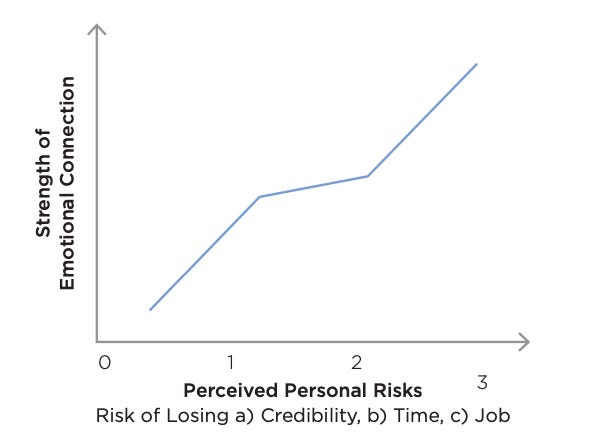Navigating Software Purchasing Psychology
The role of emotion in B2B Sales, bounded rationality, and capitalising on motivations
Thank you to the 1,600+ readers reading this. As always, please drop your comments below or reply direct to this email, I look forward to hearing your input on another key GTM lever.
Evaluation of software normally boils down to an assessment of the Return On Investment (ROI) for the buying company. Much of the rich literature on product marketing builds on this core assumption of rationality in software purchasing; precisely measuring ROI and communicating it to decision-makers throughout the funnel is paramount to top-down enterprise sales.
Whilst this goes some way to cracking the code of B2B sales, the biggest unlock is not cold, calculated analysis of ROI for the company, but rather the emotional frame of mind of the purchasing decision-maker and how the software benefits them. Miles Grimshaw recently described the game at play to Patrick O'Shaughnessy:
And there's this question of how are you also helping the career needs reputationally is giving superpowers to your end buyer, your end adopter, your end user inside a company.
How could it be that someone by adopting you gets that promotion.
The weight ascribed to personal value over business value will confound most founders and product marketers. In 2013, CEB (now Gartner) published research showing that personal value was nearly twice as important as business value to commercial outcomes.
We owe a great debt to contemporary psychologists like Dan Ariely, Daniel Kahneman and Jonathan Haidt who have consistently demonstrated the bounds of human rationality. Just as irrationality manifests in our daily lives in all kinds of situations, so it does in the decision-making framework of software purchasing.
The personal value derived from a product, in the form of a promotion, job security, or social status with peers, is a far bigger determinant of purchasing intent than the ROI to the company. The emotional connection between the buyer and the respective software is tangibly deeper than that of consumers of B2C brands.
In some sense, there's a sort of meta game that's getting played around your application, which is their professional success and their power and status and sense of excellence and sense of importance inside an organization.
BucknSF wrote about the dual dimensions of software purchasing in his excellent post 'Category Velocity', describing the role of personal and business value in distinguishing between low velocity (generally less mission-critical and and less likely to earn the buyer benefits, e.g. payroll) and high velocity software (critical to company and empowers buyer to accrue benefits, e.g. security).
Aside from the clear importance of personal value, the other key insights is that loss aversion is a much more powerful motivator than upside maximisation.
This phenomenon is well documented by Dan Ariely and other teachers of human irrationality, and is an important input into how companies craft customer personas and messaging around their product. Whilst the joy of a promotion undoubtedly weighs heavily on the mind, the peril of losing your job/credibility due to an adverse purchasing decision is far more salient. It's no wonder then that buyers feel such strong emotional connection with CRM and ERP software, let alone security software.
Said differently, fear is the most important motivator in software purchasing, above greed. In an enterprise sale, identifying the buyer's personal motivation is essential to maximising the probability of conversion.
Nick Mehta, CEO of Gainsight, articulated a framework for capitalising on the motivations of every individual involved in the buying process, which distils down to serving the buyer’s unique motivation (fear, greed, or others) throughout the sale.
One final abstraction on all of this advice is that, fundamentally, companies are comprised of people who are optimising for their careers, and your software must serve them in this respect before any other criteria.
Having won over key individuals in the buying process, companies have to apply the finishing touches by equipping these individuals to become champions/advocates with the same persona-based messaging to any holdouts internally on the purchase.








Hey this totally changed how I think about the software sale.
People are people at the end of the day, not machines working at a company.
Great article. Thanks for it!
Last link doesn't work for me